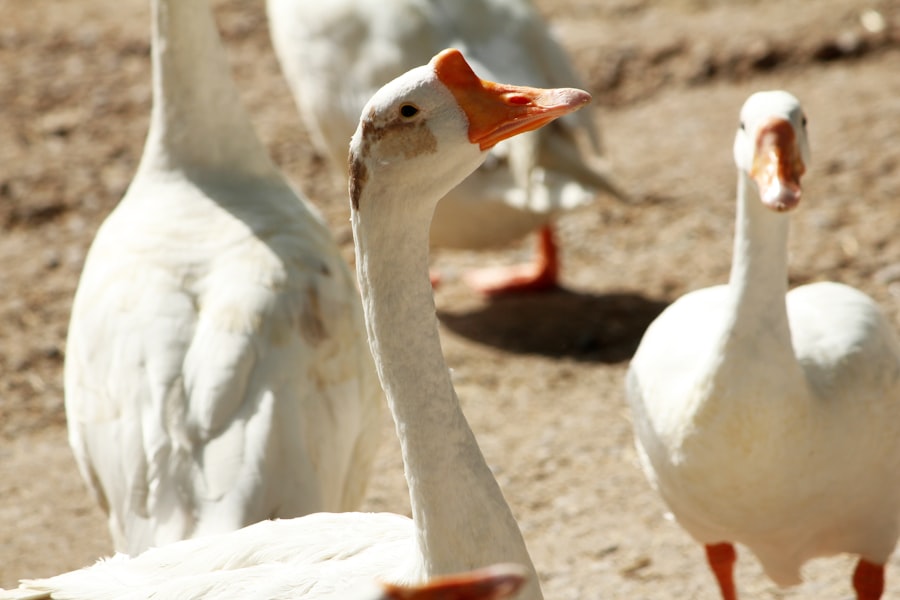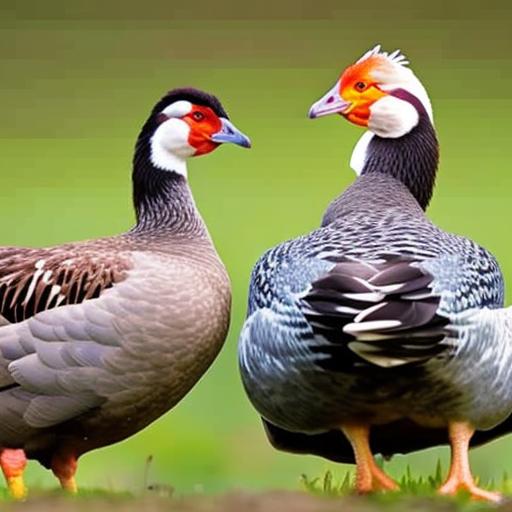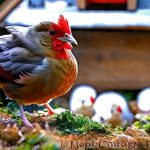Keeping geese and chickens together is a popular practice among backyard poultry enthusiasts. It offers a range of benefits, including pest control, fertilizer production, companionship, and increased egg production. As someone who has personally kept geese and chickens together, I can attest to the positive experience it can provide.
Key Takeaways
- Keeping geese and chickens together is possible and can have benefits.
- Geese and chickens have different behaviors and needs.
- Benefits of keeping geese and chickens together include pest control and increased egg production.
- Factors to consider before keeping geese with chickens include space and compatibility.
- Housing and feeding requirements for geese and chickens differ and should be considered carefully.
Differences between geese and chickens
Geese and chickens have distinct physical and behavioral differences. Geese are larger in size, with long necks and webbed feet, while chickens are smaller and have shorter necks and claws. Geese are known for their honking sound, while chickens have a variety of vocalizations. In terms of behavior, geese are more territorial and protective, while chickens tend to be more social and flock-oriented.
When it comes to egg-laying, there are also differences between geese and chickens. Geese typically lay fewer eggs than chickens, but their eggs are larger in size. Geese also have a longer incubation period for their eggs compared to chickens.
Benefits of keeping geese and chickens together
One of the main benefits of keeping geese and chickens together is pest control. Geese are excellent at foraging for insects and can help keep your yard free from pests like slugs, snails, and grasshoppers. They also have a knack for deterring larger predators like foxes or raccoons due to their size and protective nature.
Another benefit is fertilizer production. Geese produce a significant amount of manure, which can be used as a natural fertilizer for your garden or plants. Their droppings are high in nitrogen, phosphorus, and potassium, making them an excellent source of nutrients for your soil.
Companionship is another advantage of keeping geese and chickens together. Geese are known for their friendly and sociable nature, and they can provide entertainment and companionship for both you and your chickens. They can also help protect your chickens from potential threats, as they are more alert and vocal when it comes to detecting danger.
Lastly, keeping geese and chickens together can lead to increased egg production. Geese are known to stimulate egg-laying in chickens, which can result in a higher number of eggs being laid. This can be beneficial if you are looking to have a steady supply of fresh eggs.
Factors to consider before keeping geese with chickens
Before deciding to keep geese with chickens, there are several factors to consider. First, you need to ensure that you have enough space to accommodate both species. Geese require more space than chickens due to their larger size and need for grazing areas.
Breed compatibility is another important factor. Some chicken breeds may not get along well with geese due to differences in temperament or size. It’s important to research and choose chicken breeds that are known to be compatible with geese.
Temperament differences between geese and chickens should also be taken into account. Geese can be more aggressive and territorial compared to chickens, so it’s important to monitor their interactions and ensure that all birds are safe and comfortable.
Noise level is another consideration. Geese are known for their honking sound, which can be quite loud. If you have close neighbors or live in an urban area, this may be a concern.
Housing requirements for geese and chickens
When it comes to housing geese and chickens together, there are a few key considerations. The coop and run design should provide enough space for both species to move around comfortably. Geese require more space than chickens, so it’s important to ensure that the coop is large enough for them.
Nesting boxes should also be provided for both geese and chickens. Geese prefer to nest on the ground, while chickens prefer elevated nesting boxes. Providing separate nesting areas can help accommodate their preferences.
Water sources are essential for both geese and chickens. Geese require access to a large body of water for swimming and grooming, while chickens need a smaller water source for drinking and bathing. It’s important to provide both options to meet their needs.
Roosting areas should also be provided for chickens. Geese do not roost like chickens do, so it’s important to have separate areas for them to rest at night.
Feeding requirements for geese and chickens

Geese and chickens have different dietary needs, so it’s important to provide them with appropriate feed. Geese require a diet that is higher in protein and lower in carbohydrates compared to chickens. They also need access to fresh grass and forage.
Feeding schedules may also differ between geese and chickens. Geese are grazers and prefer to eat throughout the day, while chickens are more accustomed to regular feeding times. It’s important to provide both species with their preferred feeding schedule.
Supplemental feeding may be necessary, especially during certain times of the year or if there is limited access to forage. Providing additional feed can help ensure that both geese and chickens are getting the nutrients they need.
Health concerns when keeping geese with chickens
When keeping geese with chickens, there are several health concerns to be aware of. Disease transmission can be a risk, as certain diseases can be spread between geese and chickens. It’s important to practice good biosecurity measures, such as regular cleaning and disinfection of the coop, to minimize the risk of disease transmission.
Parasites can also be a concern when keeping geese and chickens together. Both species can be susceptible to external parasites like mites or lice. Regular monitoring and treatment can help prevent infestations.
Water quality is another health concern, especially for geese. They require clean water for swimming and grooming, so it’s important to regularly clean and change their water source to prevent the growth of harmful bacteria.
Social dynamics between geese and chickens
Social dynamics between geese and chickens can be complex. Geese have a strong pecking order and can be aggressive towards other birds, including chickens. It’s important to monitor their interactions and intervene if any aggression or bullying occurs.
Bonding between geese and chickens can also occur, especially if they are raised together from a young age. They can form a bond and even exhibit protective behaviors towards each other.
Tips for introducing geese to an existing chicken flock
If you already have a chicken flock and are considering adding geese, there are several tips to keep in mind. Gradual introduction is key, as sudden introductions can lead to stress or aggression. Start by allowing the birds to see each other through a fence or mesh barrier before allowing direct contact.
Supervision is important during the initial introduction period. Monitor their interactions closely and be prepared to separate them if any aggression occurs. Providing separate feeding areas can also help prevent competition and reduce the risk of aggression.
Is keeping geese with chickens right for you?
In conclusion, keeping geese and chickens together can offer a range of benefits, including pest control, fertilizer production, companionship, and increased egg production. However, it’s important to consider factors such as space requirements, breed compatibility, temperament differences, and noise level before making the decision to keep geese with chickens.
From personal experience, I have found that keeping geese and chickens together can be a rewarding and enjoyable experience. The interactions between the two species can be fascinating to observe, and the benefits they provide make it worth considering.
If you have the space, resources, and willingness to accommodate the needs of both geese and chickens, I would encourage you to give it a try. It can be a unique and fulfilling addition to your backyard poultry setup.
If you’re considering keeping a goose with chickens, it’s important to understand the dynamics between these two species. While geese and chickens can coexist peacefully, there are certain factors to consider. For more information on this topic, check out this informative article on Poultry Wizard: “The Chicken Coop Country Diner: Can You Keep a Goose with Chickens?” This article provides valuable insights and tips on successfully integrating geese into your chicken flock.
FAQs
What is the article about?
The article is about whether it is possible to keep a goose with chickens.
Can geese and chickens live together?
Yes, geese and chickens can live together. However, it is important to introduce them properly and monitor their interactions.
What are the benefits of keeping geese and chickens together?
Keeping geese and chickens together can provide benefits such as increased protection from predators, improved foraging, and social interaction.
What are the potential problems of keeping geese and chickens together?
Potential problems of keeping geese and chickens together include territorial disputes, aggression, and the risk of disease transmission.
How should geese and chickens be introduced?
Geese and chickens should be introduced gradually and in a neutral territory. It is important to monitor their interactions and separate them if necessary.
What should be considered before keeping geese and chickens together?
Before keeping geese and chickens together, factors such as space, shelter, and feeding requirements should be considered. It is also important to research the specific needs and behaviors of each species.
Meet Walter, the feathered-friend fanatic of Florida! Nestled in the sunshine state, Walter struts through life with his feathered companions, clucking his way to happiness. With a coop that’s fancier than a five-star hotel, he’s the Don Juan of the chicken world. When he’s not teaching his hens to do the cha-cha, you’ll find him in a heated debate with his prized rooster, Sir Clucks-a-Lot. Walter’s poultry passion is no yolk; he’s the sunny-side-up guy you never knew you needed in your flock of friends!







